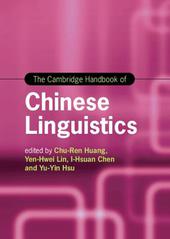
|
The Cambridge Handbook of Chinese Linguistics
Hardback
Main Details
Description
The linguistic study of Chinese, with its rich morphological, syntactic and prosodic/tonal structures, its complex writing system, and its diverse socio-historical background, is already a long-established and vast research area. With contributions from internationally renowned experts in the field, this Handbook provides a state-of-the-art survey of the central issues in Chinese linguistics. Chapters are divided into four thematic areas: writing systems and the neuro-cognitive processing of Chinese, morpho-lexical structures, phonetic and phonological characteristics, and issues in syntax, semantics, pragmatics, and discourse. By following a context-driven approach, it shows how theoretical issues in Chinese linguistics can be resolved with empirical evidence and argumentation, and provides a range of different perspectives. Its dialectical design sets a state-of-the-art benchmark for research in a wide range of interdisciplinary and cross-lingual studies involving the Chinese language. It is an essential resource for students and researchers wishing to explore the fascinating field of Chinese linguistics.
Author Biography
Chu-Ren Huang is Chair Professor of Linguistics at The Hong Kong Polytechnic University. He is fascinated by what language can tell us about human cognition and our collective reactions to natural and social environments. Yen-Hwei Lin is Professor of Linguistics at Michigan State University. She specializes in phonological theory and has a special interest in Chinese segmental phonology. She is the author of The Sounds of Chinese (2007) and has published widely in journals and edited volumes. I-Hsuan Chen is a linguist for AI applications at Amazon Web Services. She has been exploring connections between cognition and language and applying linguistic theories in psycholinguistic and computational experiments. Yu-Yin Hsu is Assistant Professor of Chinese linguistics at the Hong Kong Polytechnic University. Her research interests have been on linguistic theory, syntactic interfaces of information structure, focus prosody, psycholinguistic language processing, technology and Chinese language education, and computational natural language processing.
|